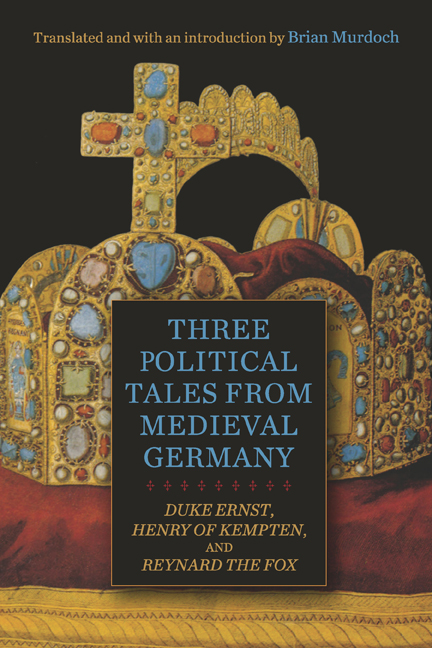 Three Political Tales from Medieval Germany
Three Political Tales from Medieval Germany Introduction (with Bibliographical Notes)
Published online by Cambridge University Press: 09 May 2024
Summary
The Political Focus
The three medieval German texts translated here are all political in that they each demonstrate just how precarious even a supposedly rigidly organized society—such as the Holy Roman Empire—can be. All three of them are designed to entertain, and they do it well, but in addition, they all instruct. Two of them are adventure stories, in different styles, but both with a message about the care needed to prevent the escalation of violence that can lead any society into a descent into chaos. The third is a bleak illustration of how things can be manipulated by the unscrupulous and can end in disaster. The three works are in very different styles. The first, Duke Ernst, begins with a political conflict but develops into what is almost a fantasy novel as the central character goes (most certainly boldly) to strange places outside the known world and meets (sometimes fights with, but also learns from) strange and alien creatures before returning to the world from which he set out. The second, Henry of Kempten, is ostensibly a novella about chivalric bravery, but it is set in a prechivalric period and is really about the ease with which an initially apparently trivial incident can escalate toward a major disaster that is here only just avoided. The third is an animal fable, part of an extensive tradition as far as genre and theme are concerned and involving the fox we know as Reynard; it is comfortably familiar for the first part, at least, but it develops into a very dark political tale indeed and ends with the death of a king.
The first two works in particular have at their center the concept of empire, rîche, and it is perhaps necessary to comment here that these are medieval texts and that the notions of empire and imperialism (and the overlaps with colonialism), not to say the very word Reich, have in recent centuries acquired overtones that they did not have in the medieval context. This does not mean that the presentation of these texts implies a defense in the modern world of medieval or of any other autocratic rule, and the emperors in the first two works are themselves, interestingly, very far from perfect;
- Type
- Chapter
- Information
- Three Political Tales from Medieval Germany<i>Duke Ernst, Henry of Kempten, and Reynard the Fox</i>, pp. ix - xxxviPublisher: Boydell & BrewerPrint publication year: 2024
